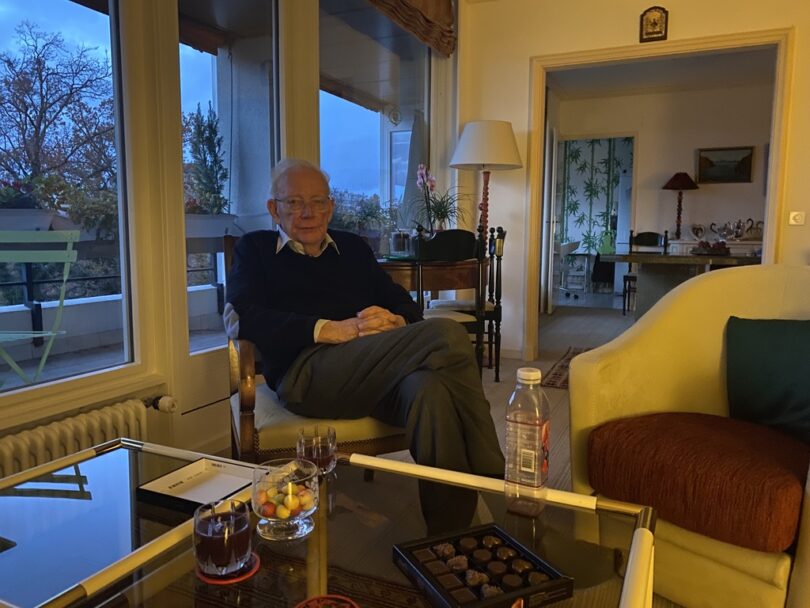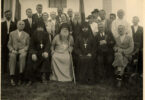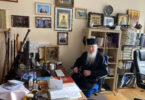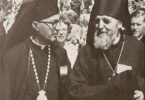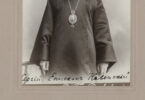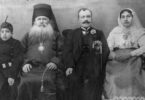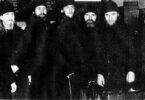Tikhon Igorovich Troyanov was born in Belgrade in 1932. At the end of the Civil War, his father, Igor Ivanovich Troyanov, aged 20 was serving in Wrangel’s Black Sea Fleet. His mother, Olga Tikhonovna Shishkova, was the maternal aunt of the future Archpresbyter Alexander Schmemann. This interview with Tikhon Igorevich thus significantly adds color to the “inter-jurisdictional” palette sketched out in the interview with his cousin Maria Alexandrovna Iordan (née Shishkova).
In 1945, Troyanov was brought to Switzerland with his family. In the same year, his father, a graduate of the Belgrade University Faculty of Theology, was ordained a priest by ROCOR First Hierarch Metropolitan Anastasii.
In terms of his career, Tikhon Igoryevich was able to achieve perhaps the greatest success possible for an outsider in Switzerland: he is a successful lawyer and one of the founding partners of Secretan Troyanov, which represents respectable clients in both the Russian Federation and the Swiss Confederation. Yet when I think of our meeting in Geneva now, a few months on, I see before me a Russian boy who, owing the events of the 20th century, has lived his life abroad.
This interview also served as testimony to another project important to my understanding of the ROCOR. Igor Ivanovich Troyanov was one of the founders of the National Alliance of Russian Solidarists (NTS in Russian). Tikhon Troyanov was also an active participant in it. Other dynamic ROCOR parishioners from Australia to Frankfurt were also associated with the NTS. It, therefore, seems expedient to get a better sense of the place of this organization among the ideologies that reigned among the members of the Russian Church Abroad.
Protodeacon Andrei Psarev, Gainesville, Georgia, USA, February 18, 2022
On Russia (“No Communion at Easter”)
Tikhon Igorevich, I would like to begin our conversation with the events of the Russian Revolution, which led directly to the constitution of the Russian Church Abroad. In my mind, the cruelty and brutality of the Russian Revolution are connected with problems in Czarist Russia, and in some ways are proportional to them. Without them, there would have been no civil war or revolution. What is your opinion on this matter?
I think that in order to understand the Russian Revolution… First, it is very difficult to understand, in general, as you know: “Russia cannot be understood with the mind” [a quote from a famous poem by Tiutchev –trans.]. Well, okay, you can sometimes try, all the same.
You have to, don’t you?
Yes. Personally, I think the main problem in Russia was the state of the Russian Church in 1917. I’ll give you one simple example. My grandfather Shishkoff, a nobleman from a good aristocratic family, was living at the time with his family in Moscow. During the First World War, his two sons were officers in the Semyonov Regiment. Once at Easter during the War, his son visited him for a few days while on leave and said he would like to go to Easter matins and receive communion. What do you think his father’s reply was?
“We do not take communion at Easter.”
Quite. He didn’t say it wasn’t customary to do so. He said that there was no communion at Easter. And he was a churchgoing man! As was my grandfather, who was an educated man and not stupid. And he said that he would go and talk to the priest, and he might allow it. Thank God, the priest was smart enough to understand that this was a man who had come for a few days, perhaps before his death, and that he could, in extremis, be given communion. And he was. But he was the only one in the church to receive communion that day! I believe that when the church has been reduced to this state, probably not only it is sick, but the country is sick as well. Not everything can be reduced to this one incident – I remind you again, not everything can be reduced to this single act of refusing of communion.
Don’t forget that when the monarchy was overthrown, the first statement of the Synod was: “the will of God has been accomplished.” It is absolutely impossible to explain the entirety of the Russian Revolution in terms of a single factor. It would be absurd. But I believe that this factor – since you are a representative of the Church and are asking the question as a clergyman…
No, I’m just interested in your opinion… who I am doesn’t play any role here…
If you were an economist, I might approach this differently. But I think the church had gotten to the point where on Easter Day, when Chrysostom says “let none go forth hungry; enjoy ye all the feast of faith” – denying people Communion on this day means that there is effectively no Church anymore. That is, it may exist, but it is in a very sad state. I think that this point, maybe, has not been studied enough among us, because very often it was said that the intelligentsia had withdrawn from the church, there’s Tolstoy, this, that, thing number five, ten. But to what extent was the Church the Church then? There were exceptions, of course. There was John of Kronstadt. He was in favor of total communion, frequent communion. You must recall?
Yes, he was a very extraordinary priest.
I think that this factor – since we are talking about the church sphere after all – may have been underestimated afterward. There was something completely inadequate there.
On the Diaspora (“The Eucharist is Above Jurisdictionality!”)
Then these people who grew up in Imperial Russia ended up in the diaspora. They had their own émigré church. The “Russian All-Military Union” tied all the members of Peter Nikolaevich Wrangel’s Russian Army together. A church of the same sort also appeared all over the world, bonding the Russian political emigration together. What processes affecting them began to occur in relation to the church?
You see, there were several different processes at work here. I am not an expert on the history of the Church Abroad.
I am interested in your opinion as someone who has lived within it.
I think there have been a number of different trends. One trend I would call the Belgrade trend because I knew it well. A return to the classical church. And to such an active, sacrificial, joyful church. But a classical one.
You mean to classical Christianity?
The church returned, so to speak, to classical, long services – to the classics. Let’s say my father, who was from a non-believing family, but passed through the Volunteer army and so on, obviously plunged headlong into it and found his calling in it. He and his friends alike. There was a different bias in Paris. In Paris, there was an attempt to make sense of Orthodoxy in a different way. Somehow to revive it and find some more living sources of it. As you know, I am a first cousin of Fr. Alexander Schmemann. I knew him well and talked to him a lot. I used to work at Radio Liberty in New York, and he would come there once a week to record his scripts. His mother, by the way, was my godmother. And because we had a close relationship, he and I would talk casually, we’d go to lunch afterward at a neighborhood diner, just the two of us, or three of us, with someone else we knew. It was something of a different path. How can put it, in general, a path toward a different understanding of Orthodoxy, one that was more open, more dynamic, more profound, from their point of view? A charismatic kind, like what Fr. Sergii Bulgakov had, shall we say, and generally many of those in Paris had. It must be said that this provided a certain vector for all of Orthodoxy.
As you know, I am a first cousin of Fr. Alexander Schmemann. I knew him well and talked to him a lot.
Once, I happened to be speaking here with a professor from the Theological Faculty in Athens and he told me that Schmemann was the greatest Orthodox theologian of the 20th century. That was his opinion. By the way, Fr. Alexander is held in great esteem in Russia. When I visit Russia, and when I lived there for 14 years, I was and am often told that there was this great theologian, Schmemann. When I say that he was my cousin, the reaction is: “It can’t be! What, did you meet him!?” Though he had biases of his own, too. You know, I was brought up in an environment where there was a lot of debating about jurisdictions. I’ve come to the conclusion that these are usually fruitless arguments because people are arguing about the wrong things, and there’s very little use for them anyway. Because people often try not to talk about what’s important, but rather about their grievances, frustrations, things like that. So there you go. I don’t know if I’ve answered your question.
Yes, yes, you have. But you kind of outlined two ways, and no one disagrees with this.
There was a third way, in Russia.
Yes, but I’m interested in your conclusion, about people not talking about what they should have been talking about… But speaking of these two ways that you are comparing, that of Paris and that of Belgrade, to which do you feel closer? How do you feel about these two ways?
I would say that the Paris way is closer to me because I was quite actively involved in youth work in Western Europe in the past decades. For example, I was actively involved in the convocation of the First Congress of Orthodox Youth in Western Europe. That was 30, no more than 45 years ago. And this Congress was attended by people from all jurisdictions.
So the Congress was “extra-jurisdictional”?
Yes. And it really was attended by young people from all jurisdictions.
Even from the Moscow Patriarchate?
Yes, absolutely. Lossky from Paris, for example. They [sic!] took an active part there. That was my policy. I agree with Vladyka (John Maximovich), who said that the Eucharist is above jurisdictionality. One may disagree with this point of view, but in any case, this stance is close to my heart.
Vladyka Vasily (Rodzianko) said the same thing, citing St. John. You mentioned jurisdictional disputes. Even Fr. Alexander Schmemann wrote a pamphlet of this nature in 1949, “The Dispute About the Church,” polemicizing with Father Mikhail Polskii and then with Vladyka Nafanail. Yet you say that this was all missing the point. What is the point, then?
In the words of Vladyka John Maximovich, that we have the Eucharist above any jurisdictionality.
You mean to say, recognizing this fact gives you a different perspective on the argument?
I think this is a very valid point. Unfortunately, all too often we forget that a basic dogma of the Church is that it is one. This comes first in the credal definition: “[I believe] in one One Holy…” We often forget this. I remember, on the whole, that even for my father, there was the Russian Church and nothing else. It must be said that my wife is Greek, and that has certainly determined a lot in my understanding.
I converted to the Constantinople jurisdiction for a relatively simple reason: 50 years ago, we were in the Russian Church, but we were also in the Greek Church, receiving communion in both. Because of all the jurisdictional difficulties, Bishop Antonii (Bartoshevich) – who was here [in Switzerland], by the way – suddenly forbade us to receive communion in the Greek Church. It was unthinkable for us, because this was my wife’s church. I was told: “You can’t take communion there.” In other words, the situation was that she could take communion there, while I could take communion in the Russian Church.
This was under Vladyka Philaret? That is, with his coming, things started to get harsher.
Correct. So we decided to be parishioners of the Greek Church, while also going to the Russian Church. If we were not allowed to take communion in one place, we would in the other. But, I must say, we started a French group there that has developed very well and we have had a parish in Chambesy for 50 years. For instance, we had a service today. We serve a liturgy every Sunday. We have a crypt there and we serve in French. I’m generally in favor of having the option to serve in languages people understand, without totally replacing everything with it. From my experience in Russia in particular, I have found that people do not understand Church Slavonic or understand it incorrectly. But that is another matter altogether. I think this topic should be approached very carefully and calmly. That is, there must not be a kind of civil war. In the French-speaking parts of Switzerland, the majority, I would say the vast majority, of Orthodox parishes, serve either in French, or in both languages. Again, I would not start a civil war over this. On the contrary, I think that we should be very calm about it, and that gradually… As far as I know, Greek parishes in America mostly serve in English, no?
Vladyka Antonii of Geneva had the reputation of being a rather open-minded bishop when compared to others in the Russian Church Abroad, and he got in trouble for concelebrating with the Exarchate. He was much more broad-minded than others. But that said, your story contradicts this a bit, doesn’t it? Why would a parishioner need to be banned from receiving communion? Especially someone in a mixed marriage. Somehow it doesn’t fit with his image.
You know, I think the situation here was difficult, because there was an Old Calendarist Greek priest (Father Vasileios Sakkas – A. P.) in the parish, and he was agitating a terribly great deal against it. Once at the liturgy he refused communion to us – not me personally – because we had been receiving communion in a Greek church. That was it. But after that, passions heated up and apparently, Archbishop Antonii decided to hush the matter up “for clarity’s sake”, as they say in Russia. But I personally could not accept it. He said it very calmly then, without any…
He didn’t explain his decision to you in any way?
My understanding is he felt that, if he had allowed us to take communion, he would have had to suspend this priest. If he had suspended him, the priest would have complained to the Synod and the Synod would have acquitted him.
But there would have been no grounds for banning him, only for discplining him in some way.
Look, if a priest publicly denies communion to parishioners on the grounds that they… I think…
Generally speaking, it’s not his right to do so.
At the very least he should have received some kind of sanction. I think he decided that if he had got sanctioned, he would have complained to the Synod, which would have exonerated him. Anyway, he decided it was better to keep the matter quiet.
He solved the problem at your expense.
He did, yes. Anyway, it all went down relatively calmly. I was even advised by my father to take communion in the Greek church and then everything would be fine. We didn’t start any arguments. Everything was relatively calm. On the whole, we have normal relations with the Russian Church. There are two parishes here: a Moscow one and one of the Church Abroad.
It would be interesting to know about your parent, Father Igor. I know almost nothing about him. What was his point of view on these changes in the course of the Russian Orthodox Church under Bishop Philaret, on self-isolation and True Orthodoxy? Was this like a continuation of the Belgrade classical model you mentioned? How did your father feel about all this?
You see, there were no specific local problems in Belgrade. There were no other jurisdictions there, and there were good relations with the Serbian Church, especially with the leadership. On the whole, this problem passed them by. Another thing is that there was a very strong anti-Sergianist sentiment there. Very strong. My father used to say that the Moscow Patriarchate was not the Russian Church. Which I couldn’t agree with. Once he got to the West, he came to feel that maybe it wasn’t that simple.
Why did the West play a role in this?
Because in Belgrade there were none of these jurisdictional issues. None of them. We were living in a Serbian milieu, there was full communion with them, everything was fine. But here… Let’s say there was a Greek church in Lausanne. I was married in a Greek church, but I was married by Vladyka Leontii, [Vladyka] Antonii’s younger brother. All in all, it was quite simple at first. It has always been my perception that we are one Church. There may be different tendencies, there may be difficulties, but we are one Church. But in the West, he felt that one ultimately could not get around the Paris jurisdiction. Then Moscow priests turned up here, and I had contacts with them, too.
I was married in a Greek church, but I was married by Vladyka Leontii, [Vladyka] Antonii’s younger brother. All in all, it was quite simple at first.
And then, when I lived in Russia, I got to know Patriarch Alexis a little and advised him as a lawyer, even before reunification. And we had a normal relationship. I even got to know the future Patriarch Kirill when he was in Geneva, albeit less than Patriarch Alexis. My wife and I went to Fr. Sergii Kiselev’s church in Moscow and we took communion there. And you probably know Mitrofanov?
Yes, I know Father Georgii.
Have you read his latest book, History of the Russian Church? It’s very well written.
I think those are his lectures?
It’s based on his lectures. They came out about two years ago. I read it recently. It’s written objectively and is quite critical of Metropolitan Sergius, but at the same time he doesn’t repudiate Metropolitan Sergius.
Yes, I understand.
But for my father, let’s say, Metropolitan Sergius – well! Do you understand? I’m far from sure it was that simple. I think that if I had been living in Russia, I would probably have gone to an official church. God knows about Metropolitan Sergius. But to judge him like that…?!
That’s fair.
Don’t forget that Vladyka Anastasii once wrote to Hitler, setting him up as an example of what a statesman should be.
Well, yes, he thanked him for the gift of the cathedral in Berlin in 1938.
No, I’m saying that one can understand Metropolitan Sergius. I don’t know; I wouldn’t make such blanket judgments against him, although I’m absolutely not a Sergianist. I’m not. But… so there were different currents in the diaspora. I think Father Alexander Schmemann contributed a very interesting one. He himself is interesting, too. I don’t know if you’ve read his articles on Russian literature?
The new book that’s out now?
Has it come out yet?
Last year, the House for the Russian Diaspora published his talks on Radio Liberty from 1970 to 1971, titled Fundamentals of Russian Culture. Our Dean, Nicolas Schidlovsky, was very taken with it. I read his Diaries and they made a huge positive impression on me.
His Diaries are interesting to read, and you can read them starting at any point. You can open them, read a dozen pages…
See, he also mentions in his Diaries that he spent a summer in Belgrade in 1940.
In 1939, not ’40.
In 1939. I met Maria Aleksandrovna Iordan and her brother Father Vladimir Shishkov.
My cousins.
But you see, it was the Russian Church Abroad that interested me… I have a positive, respectful attitude toward Father Alexander Schmemann, but I am interested in him through the prism of the object that I study, which is the Church Abroad. I saw that he always recognized Her. He never said that the Russian Church Abroad was not the Church. When Metroplitan Evlogii left the Council…
Fr. Alexander was less harsh than my father. My father used to say, “The Patriarch in Moscow is not the Russian Church.”
When Metropolitan Evlogii left the Council of Bishops in 1926, he was placed under suspension. The next thing was somehow to show people what had happened. And our Council decided that the Evlogian sacraments were without grace. We had a Father Kiprian (Pyzhov) in Jordanville.
I knew him.
Who was then a young man in Nice.
I knew him. An iconographer.
His confessor was Father Alexander Elchaninov. Monk Veniamin (Gomarteli) told me that Father Kiprian’s first encounter with the Church Abroad was when the Kursk Root Icon was brought to Nice and its custodian, I do not remember who it was then, told his confessor, Father Alexander, to remove his epitrachelion because he thought he was under this general suspension. That’s the kind of rhetoric that was brought into play. So on the one hand, Vladyka John was saying that the Eucharist was above jurisdictionality, and on the other hand, people were being offered that point of view. It wasn’t until 1935, when Metropolitan Evlogii came to Belgrade, that there was a reconciliation, these bans were lifted, thank God, and the matter was closed. But I don’t see this with Father Alexander Schmemann. He was worried that the Church Abroad didn’t understand his way. He debated, but he never used such rhetoric, that this was the Karlovci schism and not good for the soul. I’m wondering if you had any conversations with him in this respect about the Church Abroad.
Look, of course he was critical of it, but I would say critical along slightly different lines. He attributed great importance to the unity of the Orthodox Church and he thought that the Church Abroad, the Russian Church, and maybe even the Greek Church as such attached too much importance to the factor of nationality. This can be expressed roughly as follows: How can there be a feast of Russian saints? Why celebrate Russian saints separately? I’m exaggerating here, but you understand. He didn’t say this to me, but I’m trying to summarize it like this. The Church is one, though there be Russians, Greeks, Serbs, and so on. And really, the situation right now is terrible. You see it in America. I see it in Geneva, where there are 10 Orthodox parishes. And how many jurisdictions are there? Eight.
How can there be a feast of Russian saints? Why celebrate Russian saints separately? I’m exaggerating here, but you understand.
And these people don’t even antagonize each other – that would also not be the worst thing. No, they ignore each other. And in general, they are not even opposed to each other. There are Serbs, Greeks, Bulgarians. Where we are, there are at least four parishes: Greek, French, Romanian, and sometimes Georgians also serve there. That is already the beginning of something.
So, your parish is used by different communities. Is that what you mean?
There are three churches, and the Georgians serve in our crypt on Saturdays, because either their bishop or a priest from Brussels comes to visit them. They serve there once a month. We, the Greeks, and the Romanians serve there regularly. It’s a start. For example, when there was the congress of young people that I mentioned, I was very actively involved in it, and it went very well, mind you. Moreover, steps were taken at the time to make it possible to receive communion together. And since the folks from the Church Abroad could not receive communion, one Greek priest served on behalf of all. It was decided that one Greek priest would serve and then everyone could receive communion because everyone recognized him. But then that elicited a lot of reproaches. It was always my stance that, as Vladyka John says, the Eucharist is above jurisdictionality. Of course it is above it.
Do you remember Vladyka John?
I do. I had a scandalous incident with him. I was about 7 years old. I was with my grandfather. I met Vladyka John in a Russian church [in Belgrade] and he asked me my name. I told him. What’s your last name? And I couldn’t remember. For some reason my grandfather got terribly indignant afterward: “Well, how can you be that way with the bishop, it’s not nice!” He considered it the ultimate insult that I hadn’t told the bishop my name: “How could you do such a thing?” “It’s an outrage!” He was very pious and thought one simply could not do such things. That was that.
Then the next time I saw him, oddly enough, he was vested as a Catholic bishop. That was about 50 years ago. He was in Paris and he went to see Evgraf Kovalevsky and served in Catholic vestments with a Catholic crozier. That was pretty much it. But it was interesting. I remember that Kovalevsky preached very well. I left very impressed by his sermon. I don’t remember what he was talking about, but he was apparently a man with a gift of speech. That’s the last time I saw him. No, it wasn’t. I saw him later in New York in 1962, when there was some kind of Council of Bishops. We often went to Park Avenue, and he would preach, lead services. I saw him only ever on some rare occasions, in Belgrade and in New York, which is the last place I saw him.
Belgrade, Geneva, and Moscow (“No. I Didn’t Have a Patronizing Attitude toward Russians”)
Do you have any memories of Belgrade?
I lived in Belgrade for about 12 years. We left in the fall of 1944. We perceived everything as being just the way it ought to be. Belgrade was our natural environment – there was a Russian church there, I went to a Russian school, a Russian gymnasium; I had just started at the Russian gymnasium. That’s how it all was, that’s how everybody lived. But the mood was very nationalistic. I would say, pro-German. Not only in the Church, but also in the émigré community. Metropolitan Anastasii’s address praising Hitler as an exemplary statesman was no accident. He believed that this was the right way, the fight against “Jewish Freemasonry”, against the excesses of democracy; that’s what this nationalism was about. That was Ivan Ilʹin’s line in his time. In the beginning.
I lived in Belgrade for about 12 years. We perceived everything as being just the way it ought to be. Belgrade was our natural environment – there was a Russian church there; I had just started at the Russian gymnasium. That’s how it all was, that’s how everybody lived. But the mood was very nationalistic. I would say, pro-German. Not only in the Church, but also in the émigré community.
As for the church itself, there was a lingering memory of ritualism. There was a very great importance attached to the orlets in the church. As an altar-boy I held the Bishop’s crozier. I remember walking across the orlets once and the deacon told me not to do it again. It was such a… so church for me as a boy was all about turning around. Turn this way, turn that way. You know? “How could you not tell the bishop your name? God, that’s awful!”
Interesting. And yet in Serbian Orthodoxy they don’t understand it at all. Jordanville had it, too. I was recalling just today how Vladyka Laurus came out once at the polyelaios. There was suposed to be a delicate little bishop’s censer, and he was handed this “bomb.” The other subdeacon, Monk Isaakii, and I both got 12 prostrations. In my opinion, this would be unthinkable for the Serbs.
For the Greeks, too. In the Greek church, the bishop is vested in the altar, with the deacon assisting. Once a year, for some reason, at Paschal Vespers on the first day of Eastertide, he is vested in the bishop’s residence next to the church. He comes out of there in full vestments. I don’t think there is an orlets in the Greek church anymore, though in my time, there still was. And they have an orlets as big as that rug there [points]. According to the typicon, it is laid out before a newly ordained bishop, who is stood on this orlets. He nevers sees it again. No, I think we could have done with one orlets. Because all these things – somehow it went wrong, it should have been taken away, it was on the wrong side… And if there are three bishops serving, then…
So I think formalism certainly played a big role in Belgrade, but again, the diaspora was in turmoil. In the 1920s and ’30s, people didn’t really understand what had happened, and a great many people thought that it would all be over very quickly. I remember during the war my grandfather was outraged that a Russian had bought a house in Belgrade. I remember my father saying that it was impossible to buy a house, because Christ said that where your treasure is, there your heart is also. So if he was buying here, he was going to stay in Belgrade. That was during the war. I was quite an active member of the National Alliance of Russian Solidarists (Abreviated in Russian as NTS – D.A.P.) during the war. Do you know what the NTS is? Do you have a conception of it?
Back then it was still the New Generation People’s Labor Union, the New Generationists.
That’s right. By the way, my father was one of the founders.
Was your father a monarchist?
I’d say he was a moderate monarchist. I don’t think he thought it was necessary to restore the monarchy, or that it could be restored at all. I would say that he was respectful of the history of the monarchy in Russia, of Nicholas II, but he wasn’t an avid monarchist. He didn’t think that…
That it was the only political solution for Russia?
Yes. And that it was necessarily such a religious…
Like Vladyka Antonii (Khrapovitskii), who thought it was part and parcel of the Orthodox worldview?
Yes, yes.
That is, if you’re a Christian and not a monarchist, it’s kind of a contradiction in terms.
There have been a lot of arguments on the topic. And there were different kinds of monarchists, legitimists, and so on. In general, believe me, there was enough to talk about. I don’t know what’s happening in Russia right now and where things are headed. In my of view, there’s a monarchy there now.
In the 4th issue of Posev for this year, Alexey Vovk published a letter from Boris Aleksandrovich Nikolʹskii to Ivan Aleksandrovich Ilʹin regarding the situation at Holy Cross Church in Geneva in early 1945. The letter is a response to Metropolitan Anastasii’s involvement in creating a Russian Peoples’ Liberation Committee in Berlin in 1944. Are you familiar with this publication: “Things have gone so far that they defy any response”? The author finds that history is more likely to exonerate the bishops in Russia than those abroad.
Yes, this letter is about not knowing what to do in the parish, because they had received a relatively recent message from Metropolitan Anastasii that… Maybe you remember the Council in Vienna…
Yes, there was a Episcopal Conference in 1943.
A resolution that was sent out to the parish and signed by Metrioilitan Anastassy talked about “initiating prayer for God’s help in the liberation of Russia from the Bolshevik Communist yoke”. Father Sergii Orlov was here at the time. He was still old-school and highly respected. He refused to read out this encyclical. Here in Switzerland, it was difficult to read out such an encyclical publicly, because Switzerland had at least a neutral stance and was generally quite hostile to Hitler. They were afraid that Hitler would take over Switzerland, too, so they didn’t have particularly warm feelings toward him. But he refused to read out this encyclical. There was all kinds of upset over this, and what happened at the end of the war, in 1945, was that the hieararch of the Church Abroad on whom Geneva depended, Metropolitan Serafim (Lukʹianov) from Paris, transferred to the Moscow Patriarchate. He wrote a letter to Father Leontii (Bartoshevich), who was then already rector of the parish after Fr. Sergii’s death, that henceforth the patriarch of Moscow was to be commemorated. And Father Leontii began commemorating the Patriarch of Moscow, simply because his bishop had said that the Patriarch of Moscow must be commemorated. And then there was the brotherhood of St. Job of Pochaev with Father Serafim (Ivanov), who, I think, later became the rector [of the monastery] in Jordanville. This was all apparently in the spring of 1945, these events. And he was terribly anti-Moscow. So he told Leontii that it was an outrage – how could the Patriarch of Moscow be commemorated? But Fr. Leontii quite rightly answered him that his bishop had given him a very definite instruction, “and I cannot serve without a bishop”. He may have been right about this. Then they did an interesting thing – they contacted Archbishop Vitalii (Maksimenko) in New York by telephone asking him to take Geneva under his omophorion temporarily. Vladyka Vitalii was very hesitant, for accepting a parish Geneva under the omophorion of New York and commiting an anticanonical act. But in the end he agreed, saying that he was willing to receive it conditionally and temporarily. After that, this amicability settled here in Geneva, I think, for a year and a half. What I know is that my dad and I visited the villa where the brotherhood of St. Job of Pochaev was living, and that was in the summer of 1945, no earlier than August. Vladyka Anastasii came here in September of 1945. I can even say exactly when he arrived, because his first service was at the Exaltation of the Cross, and the cathedral here is dedicated to the Exaltation of the Cross. It wasn’t a cathedral then. I was at that service and served with him as a staff-holder, so I can say with confidence that he first served here at the Exaltation of the Cross in 1945. And that’s when it all came together. Vladyka Nathanail was consecrated as a bishop for West Europe and everything became normalized somehow as part of the Church Abroad.
I see. What about the different members of the émigré community? What is it like for you and your parents to meet younger after war émigrés from the Soviet Union? I think they were rather painful encounters between bearers of different cultures.
Yes, of course, when the war came, it was difficult, because, for my parents, Russia was a completely different country. In general, I would say that they found a common language and somehow there was no friction on this ground. Though the relationship… And the audience was often not very cultured. But gradually somehow all this… I must say that I personally lived in Russia for 14 years, worked there, we had an office there, and my relations with the Russians were ideal.
This is interesting for us now to come to the topic of Russia. You’ve lived here most of your life and worked in Russia. Which world do you belong to?
Certainly both. And I felt perfectly comfortable in Russia. I knew a lot of people there, and I never got the feeling that they were Russians of a different kind. Well, they were different, but on the whole…
So you didn’t have a patronizing attitude towards them?
No. My wife, strange as it may seem, had absolutely ideal relations with them; she is not Russian, but she was adored there and still gets calls from Moscow all the time. All in all, I have flown to Moscow 100 times. The last time I got a Russian visa, there was a section asking how many times I’d been to Russia. I answered that I had been there about 100 times. So there was a lot of hassle around this. I had a whole team of lawyers. In general, I have a very good relationship with Russia.
Interview by Deacon Andrei Psarev

